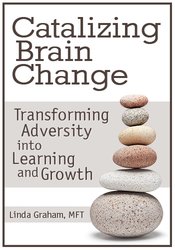

Helping clients develop flexible and adaptive strategies for coping with both everyday disappointments and extraordinary disasters is at the heart of the therapeutic process. In this workshop, we’ll focus on showing clients how to harness their own brain’s capacity for rewiring negative coping patterns that block growth. We’ll also identify empirically validated tools to encode new, more flexible patterns of response.
| File type | File name | Number of pages | |
|---|---|---|---|
| Manual - Catalyzing Brain Change (29.85 MB) | 33 Pages | Available after Purchase |

Linda Graham, MFT, is an experienced psychotherapist in the San Francisco Bay Area, bestselling author and international speaker. She integrates modern neuroscience, mindfulness practices, and relational psychology in her worldwide trainings. She is the author of Bouncing Back: Rewiring Your Brain for Maximum Resilience and Well-Being, winner of the 2013 Books for a Better Life award and the 2014 Better Books for a Better World award. She publishes a monthly e-newsletter, Healing and Awakening into Aliveness and Wholeness and weekly Resources for Recovering Resilience. For more information visit www.lindagraham-mft.net
Linda draws on her own experiences of healing and awakening as well as more than two decades of integrative study, practice and teaching of transformational psychotherapies, vipassana meditation, life coaching, and facilitating groups and workshops to become a skillful guide interweaving many paths of compassionate, conscious connection. She is passionate about integrating the paradigms and practices of modern neuroscience, Western relational psychology and Eastern contemplative practice.
Speaker Disclosures:
Financial: Linda Graham maintains a private practice. She receives a speaking honorarium and recording and book royalties from PESI, Inc. She presents professionally and receives compensation, and she receives royalties as a published author. She has no relevant financial relationships with ineligible organizations.
Non-financial: Linda Graham has no relevant non-financial relationships.
Please wait ...